Serving 292 students in grades Prekindergarten-2, Bushland Elementary School ranks in the top 20% of all schools in Texas for overall test scores (math proficiency is top 20%, and reading proficiency is top 20%).
The percentage of students achieving proficiency in math is 61% (which is higher than the Texas state average of 41%). The percentage of students achieving proficiency in reading/language arts is 71% (which is higher than the Texas state average of 51%).
The student:teacher ratio of 13:1 is lower than the Texas state level of 14:1.
Minority enrollment is 31% of the student body (majority Hispanic), which is lower than the Texas state average of 75% (majority Hispanic).
Quick Stats (2025)
- Grades: Prekindergarten-2
- Enrollment: 292 students
- Student:Teacher Ratio: 13:1
- Minority Enrollment: 31%
- Overall Testing Rank: Top 20% in TX
- Math Proficiency: 61% (Top 20%)
- Reading Proficiency: 71% (Top 20%)
- Source: National Center for Education Statistics (NCES), TX Dept. of Education
Top Rankings
Bushland Elementary School ranks among the top 20% of public schools in Texas for:
Category
Attribute
Overall Rank
Math Proficiency
Reading/Language Arts Proficiency
School Overview
Bushland Elementary School's student population of 292 students has declined by 40% over five school years.
The teacher population of 22 teachers has declined by 38% over five school years.
Grades Offered
Grades Prekindergarten-2
Total Students
292 students
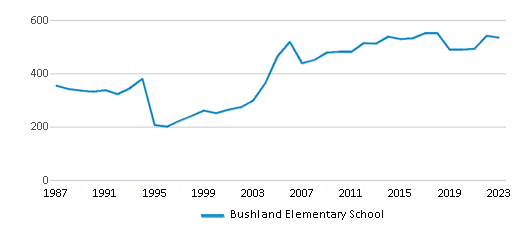
Gender %
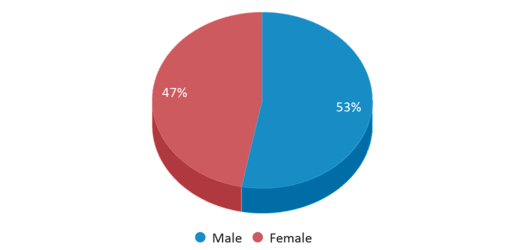
Total Classroom Teachers
22 teachers
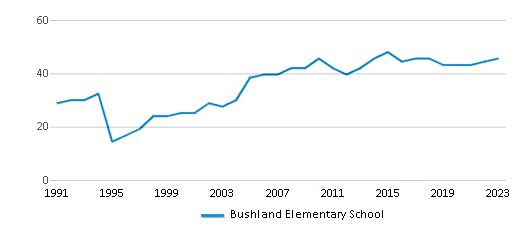
Students by Grade
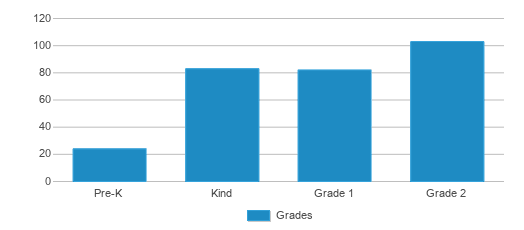
School Rankings
Bushland Elementary School ranks within the top 20% of all 8,188 schools in Texas (based off of combined math and reading proficiency testing data).
The diversity score of Bushland Elementary School is 0.46, which is less than the diversity score at state average of 0.64. The school's diversity has stayed relatively flat over five school years.
Overall Testing Rank
#954 out of 8188 schools
(Top 20%)
(Top 20%)
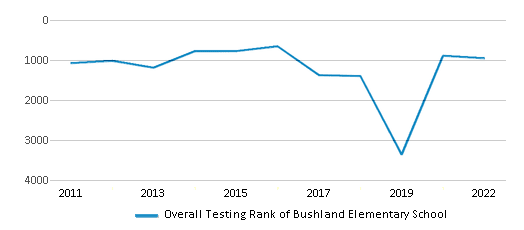
Math Test Scores (% Proficient)
61%
41%
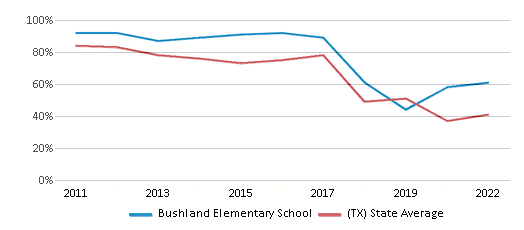
Reading/Language Arts Test Scores (% Proficient)
71%
51%
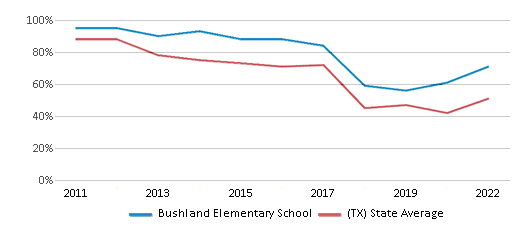
Student : Teacher Ratio
13:1
14:1
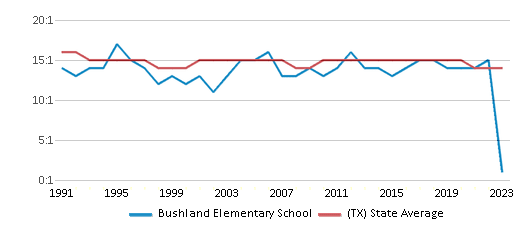
American Indian
n/a
n/a
Asian
n/a
6%
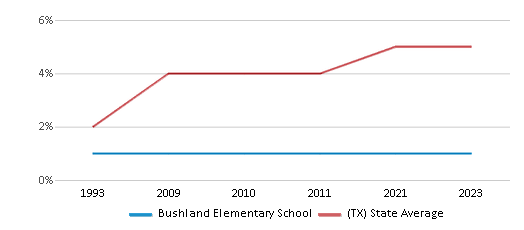
Hispanic
25%
53%
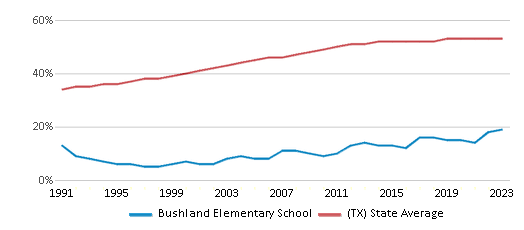
Black
2%
13%
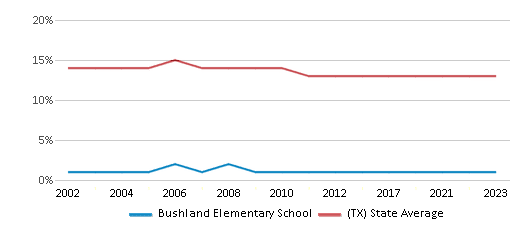
White
69%
25%
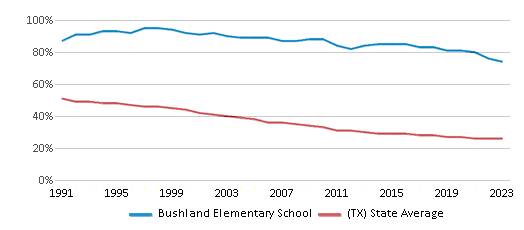
Hawaiian
1%
n/a
Two or more races
3%
3%
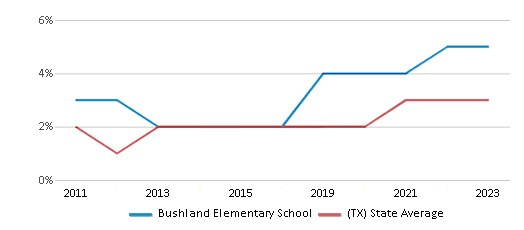
All Ethnic Groups
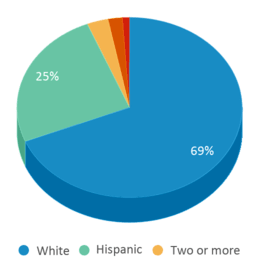
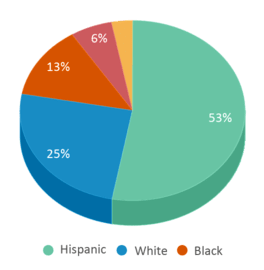
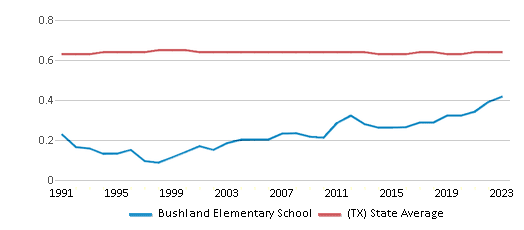
Participates in the National School Lunch Program (NSLP)
Yes
Eligible for Free Lunch
14%
57%
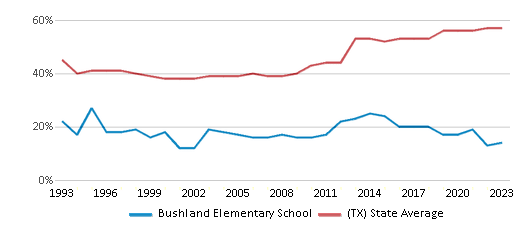
Eligible for Reduced Lunch
4%
5%
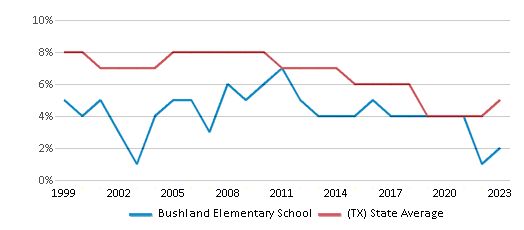
School Statewide Testing
School District Name
Source: National Center for Education Statistics (NCES), TX Dept. of Education
Profile last updated: 02/09/2025
Frequently Asked Questions
What is Bushland Elementary School's ranking?
Bushland Elementary School is ranked #954 out of 8,188 schools, which ranks it among the top 20% of public schools in Texas.
What schools are Bushland Elementary School often compared to?
Bushland Elementary Schoolis often viewed alongside schools like Arden Road Elementary School, Hillside Elementary School by visitors of our site.
What percent of students have achieved state testing proficiency in math and reading?
61% of students have achieved math proficiency (compared to the 41% TX state average), while 71% of students have achieved reading proficiency (compared to the 51% TX state average).
How many students attend Bushland Elementary School?
292 students attend Bushland Elementary School.
What is the racial composition of the student body?
69% of Bushland Elementary School students are White, 25% of students are Hispanic, 3% of students are Two or more races, 2% of students are Black, and 1% of students are Hawaiian.
What is the student:teacher ratio of Bushland Elementary School?
Bushland Elementary School has a student ration of 13:1, which is lower than the Texas state average of 14:1.
What grades does Bushland Elementary School offer ?
Bushland Elementary School offers enrollment in grades Prekindergarten-2
What school district is Bushland Elementary School part of?
Bushland Elementary School is part of Bushland Independent School District.
School Reviews
2 4/18/2011
Bushland Elementary School has a serious problem with all forms of bullying. While the correct words and images abound, the reality of the school's plan of action for dealing with Bully Problem is, as one prominant school official said, ...hopefully the bully will move on to a weaker child soon. Teachers routinely use humiliation before one's peers as teaching tactic as in Look class, everyone has a star except... and as a means of modifying parent behavior through the children. I have witnessed several incidents where teachers and staff spoke to tearful children with such harsh contempt, that I question as my first grader believes they don't really like kids. Attempts to promote substantive safety measures had such poor follow up that my child left second grade believing teachers lie; they don't have to like you and they won't keep you safe. Discipline is inequitable and punative in nature. Oddly, self defense is harshly punished by adults whose goal is to teach ...a lesson, what ever it takes while at the same time aggressive bullying is seen as a rite of passage, that merrits no more than time out or home for TLC. Parent involvement is tolerated only to the extent that is supports the prejudices and inequalities that exisit across all levels of the system. Bushland has the words but not the actions of a bully free school.
Review Bushland Elementary School. Reviews should be a few sentences in length. Please include any comments on:
- Quality of academic programs, teachers, and facilities
- Availability of music, art, sports and other extracurricular activities
Recent Articles

What Is A Charter School?
Explore the world of charter schools in this comprehensive guide. Learn about their history, how they operate, and the pros and cons of this educational innovation. Discover key facts about charter schools, including admission policies, demographics, and funding, as well as what to look for when considering a charter school for your child.

10 Reasons Why High School Sports Benefit Students
Discover the 10 compelling reasons why high school sports are beneficial for students. This comprehensive article explores how athletics enhance academic performance, foster personal growth, and develop crucial life skills. From improved fitness and time management to leadership development and community representation, learn why participating in high school sports can be a game-changer for students' overall success and well-being.

February 05, 2025
Understanding the U.S. Department of Education: Structure, Impact, and EvolutionWe explore how the Department of Education shapes American education, from its cabinet-level leadership to its impact on millions of students, written for general audiences seeking clarity on this vital institution.





